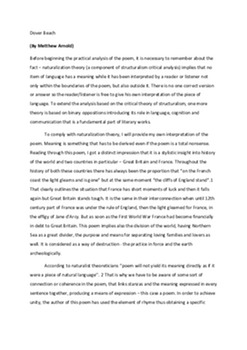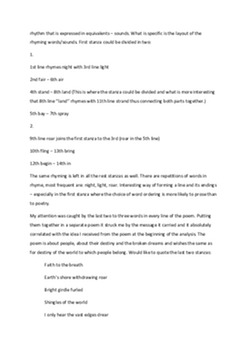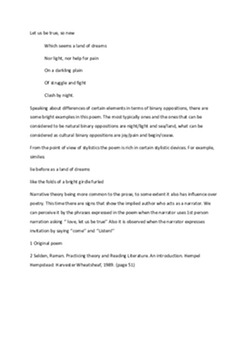Dover Beach
Before beginning the practical analysis of the poem, it is necessary to remember about the fact – naturalization theory (a component of structuralism critical analysis) implies that no item of language has a meaning while it has been interpreted by a reader or listener not only within the boundaries of the poem, but also outside it. There is no one correct version or answer so the reader/listener is free to give his own interpretation of the piece of language. To extend the analysis based on the critical theory of structuralism, one more theory is based on binary oppositions introducing its role in language, cognition and communication that is a fundamental part of literary works.
To comply with naturalization theory, I will provide my own interpretation of the poem. Meaning is something that has to be derived even if the poem is a total nonsense. Reading through this poem, I got a distinct impression that it is a stylistic insight into history of the world and two countries in particular – Great Britain and France. Throughout the history of both these countries there has always been the proportion that ‘’on the French coast the light gleams and is gone” but at the same moment “the cliffs of England stand”.1 That clearly outlines the situation that France has short moments of luck and then it falls again but Great Britain stands tough. It is the same in their interconnection when until 12th century part of France was under the rule of England, then the light gleamed for France, in the effigy of Jane d’Arcy. But as soon as the First World War France had become financially in debt to Great Britain. This poem implies also the division of the world, having Northern Sea as a great divider, the purpose and means for separating loving families and lovers as well. It is considered as a way of destruction - the practice in force and the earth archeologically.
According to naturalist theoreticians ‘’poem will not yield its meaning directly as if it were a piece of natural language’’. 2 That is why we have to be aware of some sort of connection or coherence in the poem, that links stanzas and the meaning expressed in every sentence together, producing a means of expression – this case a poem. In order to achieve unity, the author of this poem has used the element of rhyme thus obtaining a specific rhythm that is expressed in equivalents – sounds. What is specific is the layout of the rhyming words/sounds. First stanza could be divided in two:
1.
1st line rhymes night with 3rd line light
2nd fair – 6th air
4th stand – 8th land (This is where the stanza could be divided and what is more interesting that 8th line ‘’land’’ rhymes with 11th line strand thus connecting both parts together.)
5th bay – 7th spray
2.
9th line roar joins the first stanza to the 3rd (roar in the 5th line)
10th fling – 13th bring
12th begin – 14th in
The same rhyming is left in all the rest stanzas as well. There are repetitions of words in rhyme, most frequent are: night, light, roar. Interesting way of forming a line and its endings – especially in the first stanza where the choice of word ordering is more likely to prose than to poetry.
My attention was caught by the last two to three words in every line of the poem. Putting them together in a separate poem it struck me by the message it carried and it absolutely correlated with the idea I received from the poem at the beginning of the analysis. The poem is about people, about their destiny and the broken dreams and wishes the same as for destiny of the world to which people belong. Would like to quote the last two stanzas:
Faith to the breath
Earth’s shore withdrawing roar
Bright girdle furled
Shingles of the world
I only hear the vast edges drear
Let us be true, so new
Which seems a land of dreams
Nor light, nor help for pain
On a darkling plain
Of struggle and fight
Clash by night.
Speaking about differences of certain elements in terms of binary oppositions, there are some bright examples in this poem. The most typically ones and the ones that can be considered to be natural binary oppositions are night/light and sea/land, what can be considered as cultural binary oppositions are joy/pain and begin/cease.
From the point of view of stylistics the poem is rich in certain stylistic devices. For example, similes:
lie before as a land of dreams
like the folds of a bright girdle furled
Narrative theory being more common to the prose, to some extent it also has influence over poetry. This time there are signs that show the implied author who acts as a narrator. We can perceive it by the phrases expressed in the poem when the narrator uses 1st person narration asking ‘’ love, let us be true’’ Also it is observed when the narrator expresses invitation by saying ‘’come’’ and ‘’Listen!’’
1 Original poem
2 Selden, Raman. Practicing theory and Reading Literature. An introduction. Hempel Hempstead: Harvester Wheatsheaf, 1989. (page 51)


